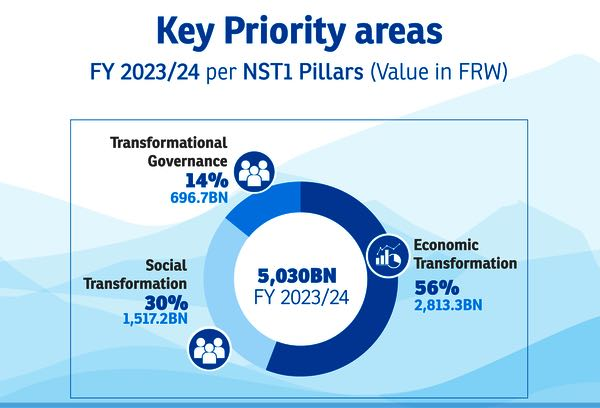
The Minister of Finance and Economic Planning Dr. Uzziel Ndagijimana today presented to both chambers of parliament, the Budget Framework Paper (BFP) and medium term budget estimates for 2023/24-2025/26.
The budget for the fiscal year 2023/24 will reflect the medium term fiscal path which allows for an increased spending to reach National Strategy for Transformation (NST1) goals while maintaining public debt to sustainable levels.
Despite ongoing economic recovery, Rwanda is still dealing with COVID-19 pandemic effects, climate change, high inflation, ongoing supply chain issues caused by the Russia-Ukraine war among other economic challenges. However, the Government will continue to champion economic recovery through supporting businesses affected by Covid-19 and creating jobs. On top of that, key investments in education, healthcare, ICT, and agriculture will be at the forefront of the ongoing government effort to invest in Rwanda’s future, through the National Strategy for Transformation.
“Our economic recovery has been strong despite global shocks. Government will prioritize fiscal consolidation and focus on continued economic recovery through supporting businesses affected by covid-19, easing inflation and investing in agriculture,” Minister Ndagijimana said.
Rwanda’s economy is projected to grow by 6.2 percent in 2023 compared to 8.2% in 2022. owing to global uncertainties, and by 6.7 and 7 percent in 2024 and 2025 respectively.
Proposed 2023-24 Budget
The proposed total resources estimated for fiscal year 2023/24 amount to Frw 5,030.1 billion, representing Frw 265.3 billion or 6% increase compared to Frw 4,764.8 announced in the 2022/23 revised budget.
The projected budget is comprised of Frw 3,151 billion of revenue which represents 63% of the total budget, external grants of Frw 652.1 billion representing 13% of the entire budget and external loans will amounting to Frw 1,225.1 billion or 24% of the total budget.
On the expenditure front, the 2023/24 budget is projected to be Frw 5,030.1 billion. Development budget and policy lending is projected at Frw 2,119.3 billion representing 42% of the budget while recurrent budget is estimated at Frw 2,910.8 or 58% of the total envelope.
Key priorities for the 2023/24 national budget will include strengthening the health system; increasing agriculture and livestock productivity; scaling up social protection coverage; improving the quality of education, creating of employment opportunities through investment in public works and support to micro, small, medium and large enterprises affected by COVID-19 through the economic recovery fund and manufacture to build and recover programs.
Other interventions will include support for Made in Rwanda; promotion of digital technologies to improve service delivery; improving access to quality education; eradication of malnutrition and stunting and strengthen disaster preparedness and management among others
BFP is a document outlining Government economic policies over the medium term that helps lay the foundations of the next fiscal budget. It is prepared in accordance with article 34 of the Organic Law on public finance management and outlines the Government’s macroeconomic and fiscal policy stance as well as the budget policy over a 3-year horizon. The 2023/24-2025/26 BFP provides the basis for the preparation of the 2023/24 budget which will be read in June this year.
Policies and strategies over the medium term are by and large guided by Vision 2050, National Strategy for Transformation (NST1) as well as the seven-year government program. (End)
